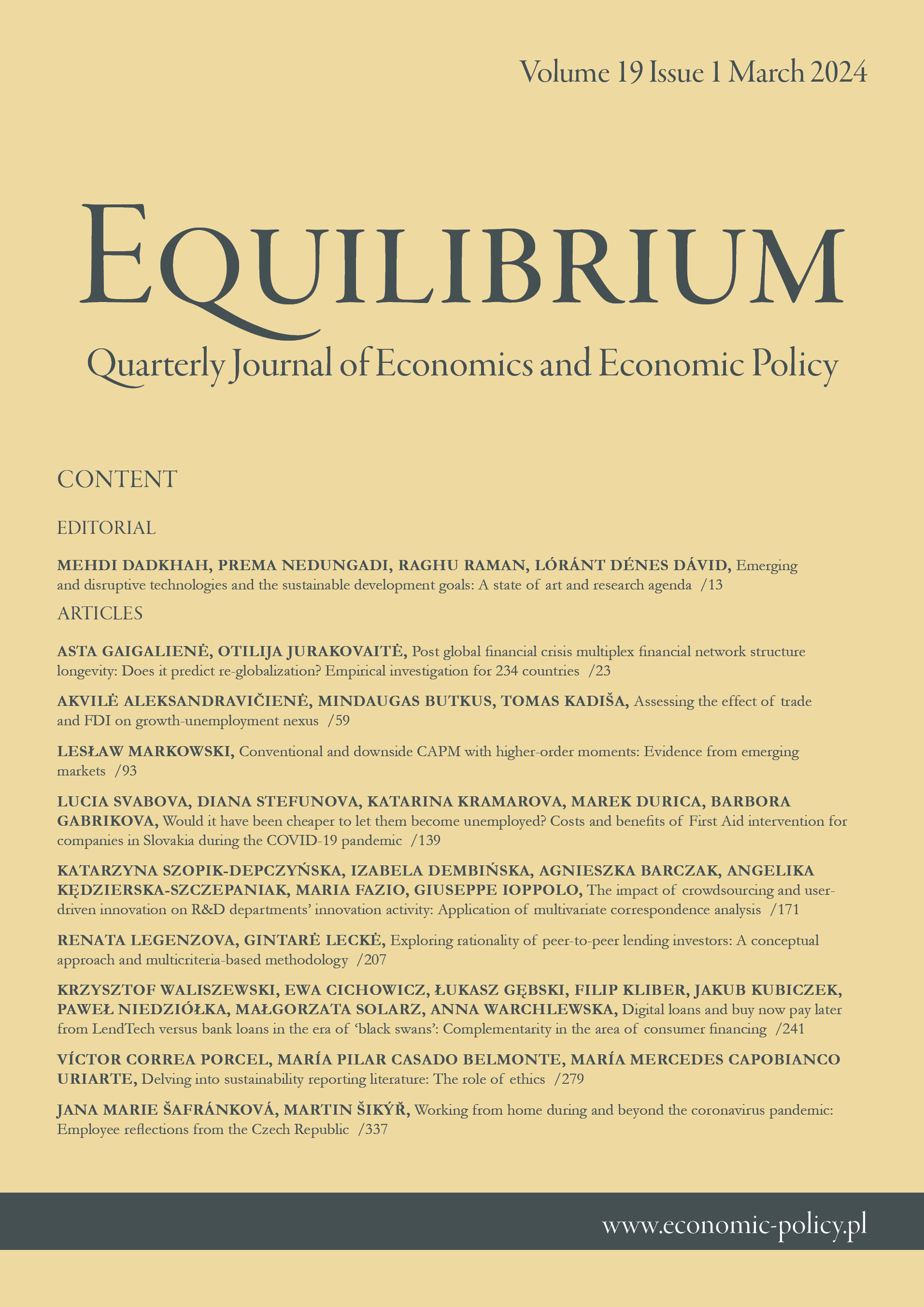Social Efficiency of Employment in Three Sectors - a Comparison of Polish Regions
IF 5
Q1 ECONOMICS
Equilibrium-Quarterly Journal of Economics and Economic Policy
Pub Date : 2017-09-30
DOI:10.24136/EQ.V12I3.22
引用次数: 14
Abstract
Research background: Regions that are able to use their resources in the most efficient way could be perceived as valuable benchmarks when shaping socio-economic policy. The concept of efficiency, however, may be related not only to pure economic categories but to social goals as well. The economic and social spheres overlap and often have some common origins, among which, the sectoral structure of employment seems to be an important one. Purpose of the article: The aim of the study was to compare the social efficiency of employment in three sectors in Polish voivodeships. Not only were we evaluating the relative performance of each region, but we were also paying attention to the efficiency of engagement of human resources in the agricultural, industrial and service sectors. Methods: We adopted the DEA method to assess the social efficiency of Polish regions. We have evaluated social cohesion concerning its two output dimensions: positive, which may be described by social activity, and negative, which may be reflected in the form of social exclusion stemming from material sources. We took into account the level of employment in agricultural, industrial and service sectors as inputs in the model and thus focused our attention on the three sectoral structure of the regional economies. Our model assumed non-radial developmental paths and was input oriented (NR-CCR). The data described the 16 Polish voivodeships in the year 2015, and were extracted from the Central Statistical Office of Poland’s databases. Findings & value added: The research conducted indicates that Polish regions which were the most efficient in terms of social integration were simultaneously those with the best economic results in terms of GDP per capita. The highest social efficiency level was characteristic for employment in the service sector, while agriculture was placed at the lowest level. The same pattern was revealed when social activity and the danger of poverty were considered separately. Thus, structural development appears to be favourable for regional economies also in terms of social cohesion, which is a factor often neglected in the literature.三部门就业的社会效率——波兰地区比较
研究背景:在制定社会经济政策时,能够以最有效的方式利用其资源的区域可被视为有价值的基准。然而,效率的概念可能不仅与纯粹的经济范畴有关,而且也与社会目标有关。经济和社会领域重叠,往往有一些共同的根源,其中就业的部门结构似乎是一个重要的来源。文章的目的:研究的目的是比较波兰省三个部门就业的社会效率。我们不仅评估了每个地区的相对表现,而且还关注了农业、工业和服务部门人力资源投入的效率。方法:采用DEA方法对波兰地区的社会效率进行评估。我们对社会凝聚力的两个产出维度进行了评估:积极的,可以用社会活动来描述;消极的,可以用源于物质来源的社会排斥的形式来反映。我们在模型中考虑了农业、工业和服务业的就业水平作为投入,从而将注意力集中在区域经济的三部门结构上。我们的模型假设了非径向发展路径,并以输入为导向(NR-CCR)。这些数据描述了2015年波兰16个省的情况,并从波兰中央统计局的数据库中提取。调查结果和附加值:所进行的研究表明,在社会融合方面效率最高的波兰地区同时也是人均国内生产总值方面经济成果最好的地区。最高的社会效率水平是服务部门就业的特点,而农业则处于最低水平。当把社会活动和贫穷的危险分开考虑时,也显示出同样的模式。因此,就社会凝聚力而言,结构发展似乎也有利于区域经济,这是文献中经常忽视的一个因素。
本文章由计算机程序翻译,如有差异,请以英文原文为准。
求助全文
约1分钟内获得全文
求助全文
来源期刊
CiteScore
9.20
自引率
3.50%
发文量
28
审稿时长
36 weeks
期刊介绍:
Equilibrium. Quarterly Journal of Economics and Economic Policy is a scientific journal dedicated to economics, which is the result of close cooperation between the Instytut Badań Gospodarczych/Institute of Economic Research (Poland) and Polish Economic Society and leading European universities. The journal constitutes a platform for exchange of views of the scientific community, as well as reflects the current status and trends of world science and economy.
The journal especially welcome empirical articles making use of quantitative methods in: Macroeconomics and Monetary Economics, International Economics, Financial Economics and Banking, Public Economics, Business Economics, Labor and Demographic Economics, Economic Development, and Technological Change, and Growth.
Current most preferable topics and special issues:
The economics of artificial intelligence: business potentials and risks;
Digitalization and entrepreneurship in economics;
Sustainable socio-economic development, environmental and ecological economics;
Transition in the energy market (improving energy efficiency, alternative energy sources, renewable energy, energy security).

 求助内容:
求助内容: 应助结果提醒方式:
应助结果提醒方式:


